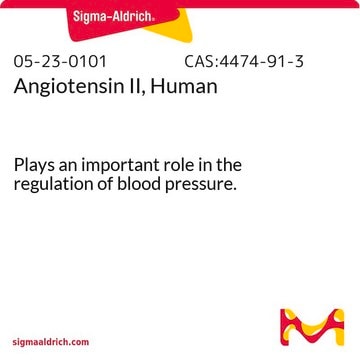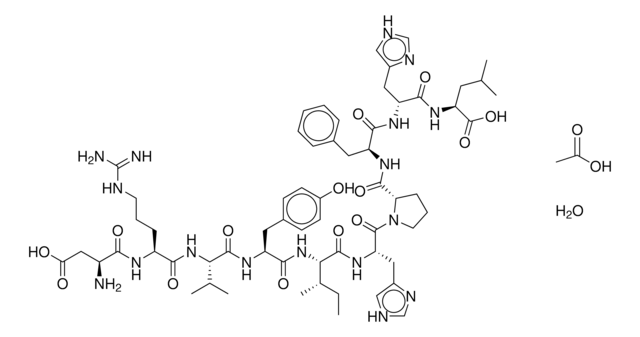SAE0075
Angiotensin Converting Enzyme, ACE, human
recombinant, ≥10 U/mg, expressed in HEK 293 cells
Synonym(s):
ACE, ACE1, CD143, DCP, DCP1, Dipeptidyl carboxypeptidase I, Kininase II, Peptidyl-dipeptidase A, Peptidyldipeptide Hydrolase
Sign Into View Organizational & Contract Pricing
All Photos(3)
About This Item
Recommended Products
General description
Recombinant human Angiotensin Converting Enzyme (ACE) is expressed in human HEK 293 cells as a glycoprotein with a calculated molecular mass of 138 kDa (amino acids 30-1232). The DTT-reduced protein migrates as a 180 kDa polypeptide on SDS-PAGE due to glycosylation. This protein is manufactured in human cells, with no serum. The human cells expression system allows human-like glycosylation and folding, and often supports higher specific activity of the protein. The protein is produced with no artificial tags.
The ACE gene codes for angiotensin-converting enzyme, which is one of the major enzymes in the RAS (renin angiotensin system). The ACE gene is localized on human chromosome 17q23.
Specificity
The specific activity of recombinant human ACE is measured by its ability to cleave hippuryl-HIS-LEU
Biochem/physiol Actions
Angiotensin I converting enzyme (ACE) catalyzes the formation of angiotensin II from angiotensin I. It is a membrane-bound enzyme, which is expressed in atherosclerotic lesions. It plays an important role in the development of various diseases like systemic lupus erythematosus, hypertension, chronic kidney disease and diabetic nephropathy.
Unit Definition
One unit is defined as the amount of enzyme required to produce 1.0 micromole of hippuric acid from hippuryl-HIS-LEU per minute in 50 mM HEPES and 300 mM NaCl at pH 8.3 at 37 oC.
Physical form
Lyophilized from 0.22 μm filtered solution in PBS, pH7.4.
Storage Class Code
11 - Combustible Solids
WGK
WGK 2
Flash Point(F)
Not applicable
Flash Point(C)
Not applicable
Certificates of Analysis (COA)
Search for Certificates of Analysis (COA) by entering the products Lot/Batch Number. Lot and Batch Numbers can be found on a product’s label following the words ‘Lot’ or ‘Batch’.
Already Own This Product?
Find documentation for the products that you have recently purchased in the Document Library.
Customers Also Viewed
Local corticosterone production and angiotensin-I?converting enzyme shedding in a mouse model of intestinal inflammation
Salmenkari H, et al.
World Journal of Gastroenterology, 21(35), 10072-10072 (2015)
Genetic Polymorphism of Angiotensin-Converting Enzyme and Chronic Obstructive Pulmonary Disease Risk: An Updated Meta-Analysis.
Kang SW, et al.
BioMed Research International (2016)
ACE Gene I/D Polymorphism and Obesity in 1,574 Patients with Type 2 Diabetes Mellitus.
Pan YH, et al.
Disease Markers (2016)
Angiotensin-Converting Enzyme in Smooth Muscle Cells Promotes Atherosclerosis
Chen X, et al.
Arteriosclerosis, Thrombosis, and Vascular Biology (2016)
Ander Vergara et al.
International journal of molecular sciences, 23(21) (2022-11-12)
Treatments with sodium-glucose 2 cotransporter inhibitors (SGLT2i) or endothelin receptor antagonists (ERA) have shown cardiorenal protective effects. The present study aimed to evaluate the cardiorenal beneficial effects of the combination of SGLT2i and ERA on top of renin-angiotensin system (RAS)
Our team of scientists has experience in all areas of research including Life Science, Material Science, Chemical Synthesis, Chromatography, Analytical and many others.
Contact Technical Service


![N-[3-(2-Furyl)acryloyl]-Phe-Gly-Gly](/deepweb/assets/sigmaaldrich/product/structures/225/349/530bc714-b1a8-4fdb-8082-a39329ee730a/640/530bc714-b1a8-4fdb-8082-a39329ee730a.png)








